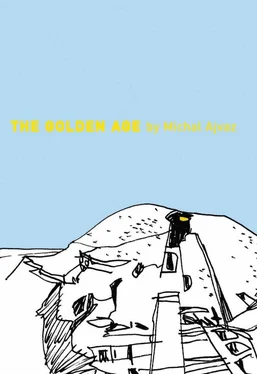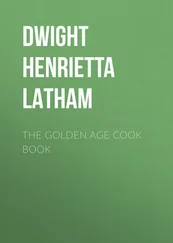Michal Ajvaz - The Golden Age
Здесь есть возможность читать онлайн «Michal Ajvaz - The Golden Age» весь текст электронной книги совершенно бесплатно (целиком полную версию без сокращений). В некоторых случаях можно слушать аудио, скачать через торрент в формате fb2 и присутствует краткое содержание. Год выпуска: 2010, Издательство: Dalkey Archive Press, Жанр: Современная проза, на английском языке. Описание произведения, (предисловие) а так же отзывы посетителей доступны на портале библиотеки ЛибКат.
- Название:The Golden Age
- Автор:
- Издательство:Dalkey Archive Press
- Жанр:
- Год:2010
- ISBN:нет данных
- Рейтинг книги:4 / 5. Голосов: 1
-
Избранное:Добавить в избранное
- Отзывы:
-
Ваша оценка:
- 80
- 1
- 2
- 3
- 4
- 5
The Golden Age: краткое содержание, описание и аннотация
Предлагаем к чтению аннотацию, описание, краткое содержание или предисловие (зависит от того, что написал сам автор книги «The Golden Age»). Если вы не нашли необходимую информацию о книге — напишите в комментариях, мы постараемся отыскать её.
is Michal Ajvaz’s greatest and most ambitious work.
The Golden Age
The Golden Age — читать онлайн бесплатно полную книгу (весь текст) целиком
Ниже представлен текст книги, разбитый по страницам. Система сохранения места последней прочитанной страницы, позволяет с удобством читать онлайн бесплатно книгу «The Golden Age», без необходимости каждый раз заново искать на чём Вы остановились. Поставьте закладку, и сможете в любой момент перейти на страницу, на которой закончили чтение.
Интервал:
Закладка:
Karael told me this was the island’s Book . I’ll write it with a capital letter because the islanders have only one book. I was surprised to discover that any form of art existed on the island, and that this should be literature was astonishing to me. Why should the islanders, who have such a love of formlessness, choose an art form that works with words? Words are surely more hostile than colours, lines or tones to a formless life. But once I familiarized myself with the Book and its history I realized it could not have been any different. I have already mentioned — in the chapter on the phonetics of the island’s sounds and rustlings — that the shapeless whirling the islanders love to watch is really the life of many waning and emerging images and shapes, that the whirring they listen to is the voice of a thousand fused stories. In this whirring the islanders recognize the appeal to protect the formless from a humiliating lapse into form; and they hear in it another appeal, too: to affirm and celebrate the wealth of the formless by hunting in its depths for some of the treasures hidden there, and to show these off to the world. It seemed to me that the islanders thought the formless resounded with the quiet plea to expose at least some of the pictures that glimmer through the whirring, thus releasing at least some of the plots and stories whose telling weaves the murmur of stillness. The appeal to keep silent and the appeal to tell become entwined, revealing a single, formless longing — a longing to unfurl the monstrous, stupefying whirling of which it has long been part and product. A whirling in the life of the formless dreams of shape that allows itself to give birth to a complicated architecture, but this soon caves in, disintegrates and crumbles to formlessness so that the process can start again at the beginning.
But a new beginning is only possible at the very end of the shaping process, not until it seems — no doubt deceptively — that the last trace of the formless has been eradicated. Tones and colours would not be able to maintain the progress of this ages-old cycle: their borders do not stretch to the most distant headland on the continent of shapes. Tones and colours would not be able to bring about the glorious re-emergence of the formless because they would be unable to eradicate these traces completely. For this you need words, sentences and stories. The murmurs, rustlings and blurred shapes of the island did not dream of pictures, sculptures and tones; the murmurs and rustlings of the island could bring forth nothing but a book. I have mentioned already that the islanders loved border territories; life on the island was played out on two borderland strips — the world of shapeless murmurs and whirls and the world described in the Babylonian architecture of the Book . Each of these territories worked on the other; the one was born out of the other and they were astonishingly similar — the monotonous murmurs and whirls were really a complicated mesh of many shapes, pictures and actions, and in the intricacy of the Book ’s architecture it was not difficult to trace the monotonous principle that determined the inserting ad infinitum of one into the other.
The history of the Book
Though indifferent to art, the islanders had their literature, and this literature was contained in the Book . The Book existed in a single copy only, and this was passed from hand to hand. There was no rule which determined how long a reader might hold on to the Book and no one ever recalled it or asked for it to be moved along to the next reader, nor was it anywhere stated who the reader should pass it on to. Usually the Book arrived unexpectedly, and whoever received it might choose to pass it on immediately or to keep it. It was typical for the Book to remain in the possession of one reader for several days or weeks. I can’t imagine that anyone ever tried to read the Book from beginning to end; readers tended to choose one of the Book ’s sections and wander around in it. Nor did I read the Book in its entirety, even though it came into my possession several times. I looked into the Book on the day of my departure from the island, and even then I found in it quarters completely unknown to me, places which I would never have the chance to get to know.
When the Book came into the possession of an islander who chose to hold on to it, he or she would read several passages. Sometimes it was passed on in the form in which it had been received; more commonly, the text was modified somehow. The islanders considered the act of writing in the Book a natural part of the process of reading it. Cases when the reader made no alteration to the text were regarded as exceptions, phases in the endless metamorphosis the Book was subject to, in which the powers of transformation were concentrated while new forms matured beneath the surface. Like the other islanders, Karael knew that books in Europe were generally read without the reader’s writing into them, but she was amazed by this European custom and struggled to imagine what such reading was like. It seemed to her as absurd and eccentric as watching a film with the same shot in every frame; the islanders studied our books with an expression of confusion we might compare to that of the novice cinema-goer confronted with a film by Andy Warhol where all that appears on screen for several hours is a view of a New York skyscraper.
So it is true to say that in most cases the reader passed on a book which differed from the one he had received. As the Book circulated, the written-over was written over — and so the reader never encountered the same work twice. He discovered that since his last reading the characters he had introduced into the plot had acquired virtues and vices of which he had had no inkling, that dark events from the lives they had led before had come to light. And so it was that the Book was always a fragment: at any given moment no one knew it in its entirety.
There were three ways of making a change in the Book : insertion, overwriting of the text and deletion. The most significant and most common changes were made by insertion; indeed, the Book itself was a kind of insert, a pocket containing a corrugated reality. Probably the Book was born at the moment its first author noticed a crack emerge in the roar of the sea or the rustling of leaves; out of this crack the pictures and the words gushed forth, just as the strips of paper forced their way out of the Book ’s pockets. The ongoing proliferation of insertions was the main event in the endless metamorphosis which was the life of the Book : the most remarkable aspect of its transformation was the expansion brought about by the insertions made on its many levels.
I know something about the history of the Book from the Book itself: in one of its pockets I found a contribution which told of the life and origins of the Book —the rest I have imagined and invented. It seems that the Book has transformed itself from the very beginning, although in the distant past it was more similar to our books in that insertions were written in gaps between lines and the margins of the page. But as the insertions became longer and longer and other insertions were inserted in them, it became more and more difficult to find unoccupied space for new text. Lettering became smaller and smaller; new sentences were woven around pre-existing text and other insertions, continuing bottom up as they wrapped around the line and proceeded back the way they had come before making another swift turn so as to proceed in the original direction; if, for example, in the corner of a page they found unoccupied space, they would contort themselves into a spiral. Text written thus gradually became illegible and assumed the character of a picture — a fantastical word-drawing. Then there was no longer any space at all for new words; it was necessary to tear out the pages, to write out on new sheets everything that was still legible. The new sheets were stuck into the Book to make a text which — initially, at least — was easy to read. But over time this, too, changed into an impenetrable jungle of letters.
Читать дальшеИнтервал:
Закладка:
Похожие книги на «The Golden Age»
Представляем Вашему вниманию похожие книги на «The Golden Age» списком для выбора. Мы отобрали схожую по названию и смыслу литературу в надежде предоставить читателям больше вариантов отыскать новые, интересные, ещё непрочитанные произведения.
Обсуждение, отзывы о книге «The Golden Age» и просто собственные мнения читателей. Оставьте ваши комментарии, напишите, что Вы думаете о произведении, его смысле или главных героях. Укажите что конкретно понравилось, а что нет, и почему Вы так считаете.












